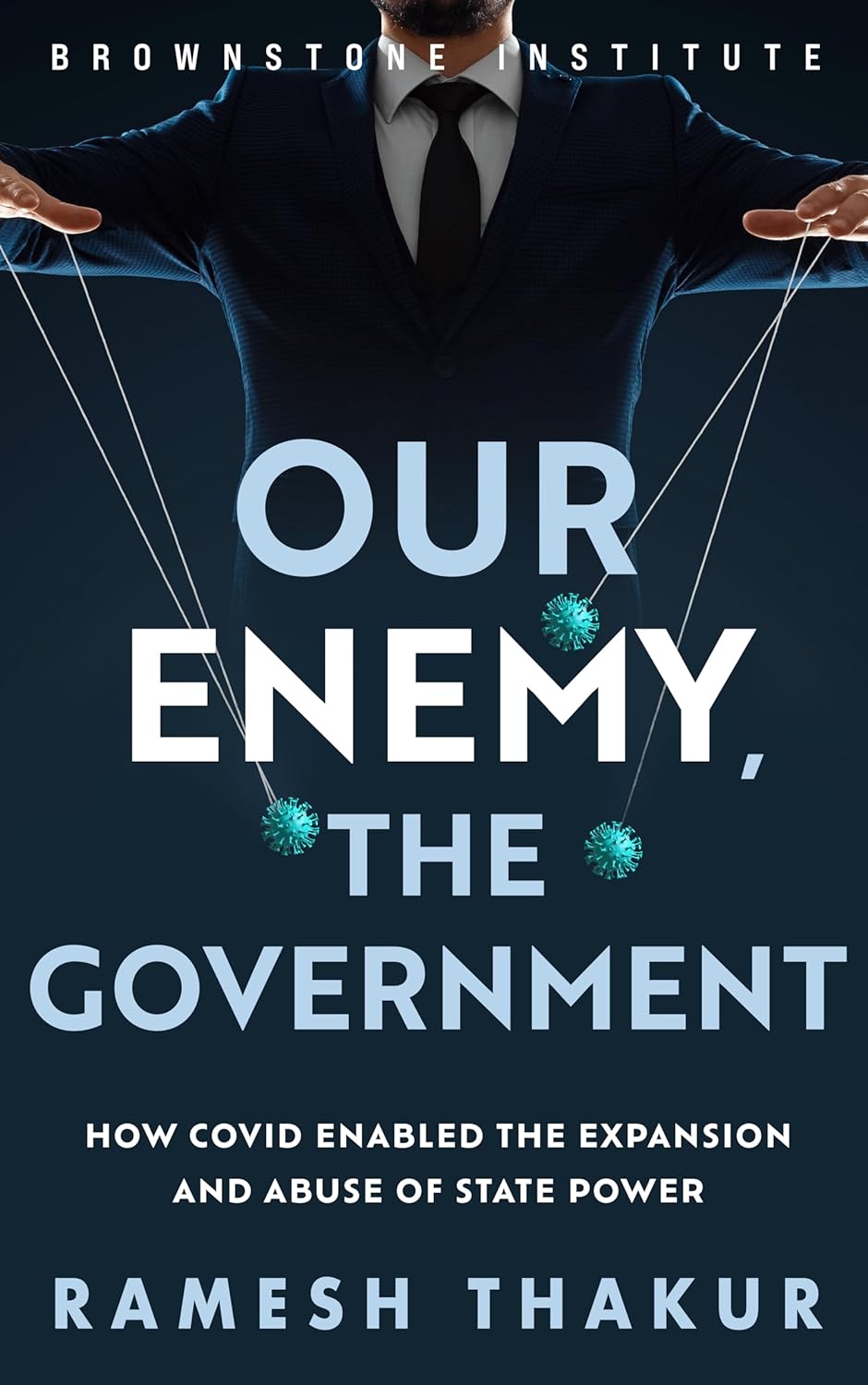By Professor Ramesh Thakur: The Brownstone Institute
The evil that men do lives after them. The good is oft interred with their bones.
Thus spake Mark Antony in Shakespeare’s Julius Caesar. So let it be with Covid. I ask as a grandparent: Why did we use children and adolescents as human shields to protect the supposed grown-ups and elderly? A major recent study concluded that lockdown harmed the emotional development of almost half of all British children.
Similar imbalance of risks-harms-benefits for the young is true of lockdowns, masks and vaccines.
The years of living with increasingly oppressive Covid restrictions and mandates is a tale of many villains complicit in tyranny and a few heroes of resistance. It’s a story of venal, incompetent politicians and brutish police – thugs in uniform – acting at the behest of ‘power drunk apparatchiks’.
Do not trust politicians and bureaucrats, veteran reporter John Stapleton warns us in Australia Breaks Apart (2023): ‘They lie for a living’.
What was there to like?
Medically idiotic, economically ruinous, socially disruptive and embittering, culturally dystopian, politically despotic: what was there to like in the Covid era?
Billions, if you were Big Pharma. Unchecked power, if you were Big State.
Power over the whole population of a state and fame with extended daily TV appearances on all channels, if you were a Chief Health Officer.
More money and power over the world’s governments and people, for the World Health Organsiation.
Template for action for climate zealots.
Dreamtime for cops given free rein to indulge their inner bully.
Anguished despair, if you were a caring, concerned citizen who loves Australia as the land of the free. The extent to which dominant majorities of peoples in countries with universal literacy can be successfully terrified into surrendering their civil liberties and individual freedoms has been as a frightening shock. ‘What will you tell UR kids?
Did you rise up or comply’, asked a sign during the Canberra protests in the summer of 2022–23. In two world wars, many risked their lives to protect our freedoms, but in the last three years, so many gave up freedoms to prolong lives.
Headlines
There evolved a co-dependency between the uber surveillance state and a Stasi-like snitch society in which ‘we are all guilty until proven uninfected’. As a retired person when the pandemic was declared in 2020, I had the freedom and time to deepen my knowledge of pandemic policy, plus the freedom to say what I wanted without fear of losing my job. Because I had been writing for many quality national and international newspapers for several decades, I had a platform to disseminate my views.
I had worked as a policy analyst and adviser in international affairs for many decades, as a global governance expert at the intersection of scholarship and policy. But I was not and am not a health policy expert. Having first familiarised myself with some of the specialist vocabulary, I applied insights from my global governance background in the worlds of research and policy to Covid-19 policy interventions, pharmaceutical and NPIs.
From the fiasco of the Iraq War, for example, I learnt that emotional arguments and moral blackmail generally imply an absence of reasoned argument and evidence and a resort to deflection and bluster instead. Moreover, when presented with excitable exclamation marks (Saddam Hussein already has weapons of mass destruction with which he can hit us in just 45 minutes!), it pays to substitute sceptical question marks instead. The Iraq War playbook – of threat inflation, thin evidence, denigration of critics, dismissal of collateral harms, lack of exit strategy, mission creep, media capture – was repeated with Covid.
Good Policy Process Delivers Better Policy Outcomes. The existing frameworks, processes and institutional safeguards under which liberal democracies operated until 2020 had ensured expanding freedoms, growing prosperity, an enviable lifestyle, quality of life, and educational and health outcomes without precedent in human history. Abandoning them in favour of a tightly centralised small group of decision-makers liberated from any external scrutiny, contestability and accountability, produced both a dysfunctional process and suboptimal outcomes: very modest gains for much long-lasting pain.
The UK Lockdown Files confirm that politics informed the policymakers in most of the key decisions on how to manage the pandemic. Accordingly, while medical specialists can debate the technical details of different medical approaches, policy specialists should be among the lead assessors in evaluating the justifications for, and results and effectiveness of, the policy interventions.
Surrendering the Population to Panic
Australia’s biggest mistake was to hand over control of the Covid agenda, in the false belief of following the science, to chief health officers who tend to be bureaucrats more than leading scientists engaged in cutting edge medical research.
The sooner we return to the conviction that good process ensures better long-term outcomes and acts as a check against suboptimal outcomes, alongside curbs on abuses of power and wastage of public funds, the better.
A sense of panic gripped the world in early 2020. If a GP reacts with panic to the symptoms of a patient, the latter should change doctors. Governments have the responsibility to calm and reassure citizens no matter how grave a crisis, not fan the flames of fear. Why then did the world’s media and politicians become collective versions of Lance Corporal Jones in Dad’s Army, screaming ‘Don’t panic! Don’t panic!’?
Panic set in to drive public policy before data was collected to show that, for most healthy people under 60, the Covid-19 virus was no worse than seasonal flu. I’d be surprised if over the entire three years, the number of 18-49 year old Australians in good health, with no comorbidity, to have died with Covid reached double figures.
Was there a single such death?
The Pied Piper of Panic
Confronted by the coronavirus pandemic as a ‘black swan’ event, most countries chose the hard suppression strategy with variably stringent lockdown measures. There should have been more caution because of the history of failed catastrophist warnings from the Pied Piper of pandemic porn Professor Neil Ferguson of Imperial College London; the massive economic costs which also have deadly impacts; the draconian infringement on individual freedoms; and the availability of other more targeted strategies rather than the mythical ‘do nothing’ alternative.
The panic-driven policy interventions demonstrated the problems and risks of basing public policy on models before sufficient data is available to test their assumptions and conclusions. They inflicted devastating social, economic, educational, health and mental health costs, especially on young people in the long term even though they were at negligible risk of serious harm from the coronavirus.
It should not, could not possibly have been a surprise to any health specialist that as social creatures, human beings are scarred by social isolation enforced through state diktats promoting the message that humans are disease-ridden biohazards.
Unless someone is silly enough to claim saving just one life is worth a complete shutdown of the whole country, the debate is about the thresholds of mortality against the human, health, social and economic costs of different strategies. Judged against these criteria, on the evidence to date, it’s a challenge to justify the hard lockdowns of Australia and New Zealand.
Covid in Third World Context
Few Westerners outside specialist circles realise the extent to which the impact of the pandemic was quite different in the poorer countries of the world. And so were the policy lessons and imperatives. For the vast majority of poor people in developing countries, on the one hand Covid was rarely at the top of deadly killer diseases.
On the other hand, lockdowns proved to be cruel, heartless and deadly. Their plight was neglected by the very people and countries that loudly trumpet their kind and caring credentials in being concerned about vulnerable and marginalised communities.
Among the most shocking developments as the pandemic dragged on for more than two years was the degree of coercion and force used by some of the best known champions of democracy. The boundary between liberal democracy and draconian dictatorship proved to be virus thin.
Tools of repression like unleashing heavily armed cops on peacefully protesting citizens, once the identifying traits of fascists, communists and tin-pot despots, became uncomfortably familiar on the streets of Western democracies.
The experience revalidated Lord Acton’s dictum: power corrupts and absolute power corrupts absolutely. Lockdowns destroyed the three ‘ls’ of lives, livelihoods and liberties. Governments have effectively stolen almost three years of our life. Pre-emptive press self-censorship helped to normalise the rise of the surveillance-cum-biosecurity state in the name of keeping us safe from the virus that is so deadly, hundreds of millions had to be tested to know they’ve had it.
Vaccines were initially recommended and subsequently mandated on the slogan that ‘No one is safe until everyone is safe’, ignoring the admission implicit in the slogan that they do not protect the vaccinated.
Freedom
Canada’s Freedom Convoy laid bare the stark reality that lockdowns are a class war waged by the laptop class on the working class, by the cultural elites on the great unwashed outside urban centres, and by the virtue signallers on independent free thinkers. Justin Trudeau’s Canada demonstrated how tactics of pressuring financial services companies into terminating accounts and tech companies to deplatform sceptics have become standard operating procedures for Western ‘democracies’ to suppress dissent, punish dissenters and banish them from participation in social life and the economy.
Australia provoked international incredulity at the brutality of its authoritarian measures to ‘crush and kill the virus’. The defining image of the pandemic state of siege in Australia will remain the case of Zoe Buhler. The episode is the very definition of a police state. Having crossed that Rubicon, how do we walk Australia back? A good start would be criminal prosecution of cops executing dictatorial edicts and of the officers and ministers authorising such action.
Many were pleasantly surprised at the announcement that Covid-19 vaccines had been developed within one year by using a revolutionary new platform. Despite the early claims of efficacy, however, many were concerned that all the safety and efficacy trials might not have been adequately completed in the accelerated timeframe. They chose to wait some time before getting vaccinated. Doubts grew with alarming rapidity as all talk of a pandemic of the unvaccinated was increasingly contradicted with real-world data from many countries.
Scepticism and opposition to vaccine mandates arose and hardened with barely concealed evidence of gaslighting on the benefits, denialism on the collateral harms, refusal either to conduct or else to publish the results of cost-benefit analyses, and banning of promising alternative treatment options like ivermectin.
Get Your Booster
The vast majority of Covid deaths in many countries in 2022–23 are among the vaccinated and boosted. This proves conclusively the ineffectiveness of vaccines at the population level, totally discredits the premise of vaccine mandates, but leaves open the possibility of net protective benefits for target groups like the elderly and people with comorbidities.
The policy conclusion is to lift mandates in public settings and prohibit companies from imposing them in most business settings, leaving it instead for people to make informed decisions in consultation with their doctors, without pressure on the latter from drug regulators. And take back all those fired for refusing the jab.
The vaccine landscape in Australia, and in particular New South Wales which published the best data for much of the time, was a microcosm of what was happening around the world.
If this is vaccine success, pray, what would failure look like? Meanwhile there is still radio silence in the mainstream media about Australia’s excess deaths.
Compliance Became a Moral Crusade. An important explanation for the continuing public support for harsh government policies seemed to be a belief that compliance was the right thing to do for the sake of the community, despite individual reservations.
Yet to my mind, selfish is: restricting Queensland hospitals for Queenslanders; the rich outbidding poor countries for booster third jabs before the latter’s first jabs; the panic run on toilet paper rolls; destroying the future of young who are least at risk for a few more months of existing without living by the elderly most at risk…
So please, don’t come a-waltzing morality on me.
The Indelible Stain of Djokovic’s Shameful Treatment
Australia’s international and state entry rules in the time of Covid-19 were frustratingly complex, hostage to subjective interpretation by airline and border staff, and often were enforced with conscience-shocking brutality.
The breath-taking arrogance of Alex Hawke using nonjusticiable ministerial discretion for an end run around a court verdict was a deliberate two-finger gesture to the rule of law backed by an independent judiciary to arbitrate the exercise of state power over individuals.
Regulators Went From Public Health Watchdogs to Pharma Poodles The longer the health authorities pushed Covid-19 vaccines, exaggerating its benefits, downplaying its rapidly waning efficacy, ignoring safety signals on its list of harms, and banning alternatives, the more attention turned to the role of drug regulators enabling pharmaceutical interventions, more than acting as watchdogs on behalf of public health and safety. It contributed mightily to the growing loss of trust in public health institutions.
Were the policies public health interventions or national security counter-measures? Was it the case, as Dr Meryl Nass suggests, ‘the vaccines were not made for the pandemic, and instead the pandemic was made to roll out the vaccines’?
Governments, health bureaucrats and drug regulators all over the world have exploited the Covid-19 crisis to grab power and gain control over our lives. Many are proving singularly resistant to relinquishing their extraordinary powers. They shifted the balance decisively from the individual-centric in liberal democracies to the collective safetyism of technocrats and experts.
The effort to shut down legitimate debates on pain of excommunication from the medical profession represents a clear and present danger to public health. If the public health clerisy becomes transparent on efficacy, investigate safety signals urgently and fully and publish the findings honestly then, in the long run, will their credibility worsen or will they begin to regain public trust and confidence?
The WHO-centred Architecture of Global Health Governance
The WHO’s performance in helping the world to manage Covid-19 proved, to be kind, to be very patchy. Its credibility was badly damaged by tardiness in raising the alarm; by the shabby treatment of Taiwan at China’s behest; by the initial investigation that whitewashed the origins of the virus; and by flip-flops on masks and lockdowns that contradicted its own collective wisdom developed over a century and was distilled in a report in September 2019.
International and domestic border closures, wholesale quarantine of healthy populations and mandatory vaccine requirements insinuated passport requirements into quotidian activities. Their effects were largely along the lines of those predicted\ in the 2019 report. Minimal overall impact on viral spread was accompanied by severe and long-term damage to many health outcomes, economic opportunities, child immunisation and educational programs, and poverty eradication policies, especially in developing countries.
They did however benefit private financial interests of some of the WHO’s biggest funders, and that is an added concern. This makes it all the more surprising that there should be a concerted effort underway to expand its authority and boost its resources by means of a new global pandemic treaty and amendments to the legally binding International Health
There was A Pandemic of Media Malfeasance In reporting on Covid, most journalists abandoned their cynicism towards official claims and instead became addicted to fear porn. A critical and sceptical profession would have put the government’s and modellers’ claims under the blowtorch and subjected them to withering criticism for the magnitude of errors of their predictions. We went ‘from disinterested journalism to Pravda in a single bound’.
A combination of incuriosity and the desire to avoid even truthful reporting in case it fed vaccine hesitancy has caused long-term damage to media credibility in its primary mission to report honestly and fairly on major stories.
Senator Alex Antic’s probing questions led to official confirmation that in less than three years, the federal government intervened 4,213 times to restrict or censor posts about the pandemic on digital platforms. Moreover, echoing the growing understanding about the lead role played by the national security apparatus in the US pandemic response, these requests to the Australian media came from the Department of Homeland Security.
The government was shameless enough to censor posts that were factually accurate but contradicted official messaging, e.g.: ‘Covid-19 vaccine does not prevent Covid-19 infection or Covid-19 transmission’. This is what has come to be known as ‘malinformation’: a neologism coined to describe information that is true, but politically inconvenient for the regime.
Collusion: The Conclusion
The history of government-media collusion in the time of Covid should make us even more wary of the proposed laws on misinformation to be policed by a more empowered Australian Communications and Media Authority (ACMA).
The Covid-19 pandemic is not the only recent example of an issue where alarmism has been fomented to command public and policy attention, demand urgent action and impose severe restrictions on existing lifestyles and activities. The most prominent example that has been running a scare campaign for decades is climate change. The two agendas reveal comparable examples of hypocrisy where the elites preach austerity and abstinence to the deplorables but exempt themselves from the same restrictions.
There is a similar claim to scientific authority that is used to stifle dissent and defenestrate sceptics, despite the mismatch between catastrophising models and observable data in both cases. Moral framing has permitted the state to assume the role of nanny to keep us safe from the predicted harms, and helped deflect criticisms of widening social inequality between the laptop and working classes and the rise of global technocrats.
The Covid years witnessed the biggest expansion of state power in the history of Western democracies, accompanied by the most serious curtailment of civil liberties, political freedoms and individual rights. All institutional checks on overreach and abuse of executive power – legislatures, the judiciary, human rights machinery, professional associations, trade unions, the Church and the media – turned out to be unfit for purpose.
I offer you two abiding verities:
1. Once governments have acquired more powers, they rarely relinquish it voluntarily.
2. Any new power that can be abused, will be abused, if not today by current agents of
state, then sometime in the future by their successors.RAMESH THAKUR
Our Enemy The Government can be ordered through Amazon by clicking the images below, or through the Brownstone Institute book store here.












December 11, 2023 at 8:29 am
The question is: ‘why were so many people so ‘easily deceived’ by Covid 19, when all one had to do was use ‘common sense’.
Everybody should have seen the stupidity of taking an ‘experimental’, ‘untested’ vaccine when our own body’s immunity was nearly 100%. Even MSM advised that.
Why didn’t they use common sense??? That’s the question of the century…..
The climate agenda is the same form of deceit, no seas or oceans have risen in the past 100 years. For DECADES since the 1970s, we have been advised that the planet was going to freeze but then recently since 2022 we’re NOW told the planet will be overheating. WTF!
Commonsense please people – take back control.